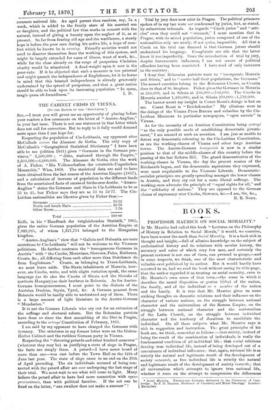THE CABINET CRISIS IN VIENNA.
(TO THE EDITOR OF THE SPECTATOR.") SIR, —I trust you will grant me an opportunity of placing before your readers a few comments on the letter of " Austro-Anglian," in your last issue. There is not one statement in that letter which does not call for correction. But to reply to it fully would demand more space than I can hope for.
Respecting the population of Cis-Leithania, my opponent cites McCulloch versus the Almanac de Gotha. The only copy of McCulloch's " Geographical Statistical Dictionary" I have been able to see (edition 1811) gives " Germans in the German pro- vinces," 3,500,000 ; " ditto, scattered through the Empire," 2,500,000=6,000,000. The Almanac de Gotha cites the work of A. Ficker, "Die Viilkenschaf ten der iisterreich-Ungarischen Monarchic," Wien, 1869. The statistical data are said to have been obtained from the last census of the Austrian Empire (1857), and a calculation of increase of population in the different lands from the ascertained facts of excess of births over deaths. "Austro- Anglian " states the Germans and Slays in Cis-Leithania to be as 33 to 41, but Ficker says they are as 33 to 5217. The Cis-
Leithan nationalities are likewise given by Ficker thus :—
Germans 35.52
North and South Slays 5G•78 Other Races 7-70 Total 100.00 Kolb, in his " Handbuch der vergleichenden Statistik," 1865, gives the entire German population of the Austrian Empire at 7,889,925, of whom 1,221,714 belonged to the Hungarian kingdom.
" Austro-Anglian's " view that " Galicia and Dalmatia are mere accretions to Cis-Leithania " will not be welcome to the Viennese politicians. He further contrasts the " homogeneous Germans in Austria" with " the Czechs, Moravians, Slovenes, Poles, Ruthenes, Croats, &c., all differing from each other more than Dutchmen do from Englishmen." Croats, as belonging to Trans-Leithania, we must leave aside. The Slavic inhabitants of Moravia, how- ever, are Czechs, write, and with slight variation speak, the same language (as do also the Czechs of Silesia and the Slovaks of northern Hungary) as their brethren in Bohemia. As for Austro- German homogeneousness, I must point to the dialects of the Austrian Duchies, Styria, Tyrol, &c. A German peasant from Bohemia would be hardly able to understand any of them. There is a large amount of light literature in the Austro-German " Mundarten."
It is not the German Liberals who cry out for an extension of the suffrage and electoral reform. But the Bohemian patriots have done so since the first assembling of the Diet in Prague, according to the octroyj Constitution of February, 1861.
I am said by my opponent to have charged the Germans with tyranny. The strictures in my former letter were on the Giskra- Herbst Cabinet and the ruthless German party in Vienna.
Respecting the " throwing petards and other kindred measures" (whatever they may be) as justifying a state of siege in Prague, the facts are simply these. A petard—I have never heard of more than one—was cast before the Town Hall on the 12th of June last year. The state of siege came to an end on the 29th of April preceding. The six individuals accused of being con- nected with the petard affair are now undergoing the last stage of their trial. We must wait to see what will come to light. Many believe the petard affair to have had more connection with agens provocateurs, than with political fanatics. If the act can be fixed on the latter, " one swallow does not make a summer " ! Trial by jury does now exist in Prague. The political prisoners spoken of in my last were not condemned by juries, but, as stated, by subservient tribunals. As regards " Czech juries " and " arti- cles" even they could not " stomach," I must mention that in Prague, with its mixed population, juries composed of one of the nationalities only are nearly, if not quite, impossible. All that a Czech on his trial can demand is that German jurors should understand his language. Complaints are rife that the latter know it too imperfectly. Since the introduction of trial by jury, despite bureaucratic influences, I am not aware of political offenders having been convicted. I have read of only instances to the contrary.
I deny that Bohemian patriots want to " incorporate Moravia and Silesia," and to "coerce half their populations, the Germans." The named countries belong to the Bohemian Crown, as Croatia does to that of St. Stephen. Ficker gives the Germans in Moravia at 530,000, and in Silesia at 256,000=786,000. The Czechs in Moravia number 1,480,000, and in Silesia 230,000=_1,719,000.
The banter anent my insight in Count Beust's doings is lost on me. Count Beust is " Reichskanzler." My allusions were to the doings of the Vienna Press Bureau and subsidies by the Cis- Leithan Ministers to particular newspapers, "open secrets" in Vienna.
As for the necessity of an Austrian Constitution being ociroyi "as the only possible mode of establishing democratic govern- ment," I am amazed at such an assertion. I am just as unable to detect any democratic colouring in the Cis-Leithan Constitution, as are the working-classes of Vienna and other large Austrian towns. The Austro-German bourgeoisie is now iu a similar position to that of the middle-classes of this country before the passing of the last Reform Bill. The grand demonstration of the working-classes in Vienna, the day the present session of the Reichsrath began, and the democratic aspirations they expressed, were most unpalatable to the Viennese Liberals. Democratic- socialist principles are greatly spreading amongst the lower classes in Austria, and they cry out for a more liberal suffrage. The working-men advocate the principle of "equal rights for all," and the "solidarity of nations." They are opposed to the German claims of supremacy over Czechs, Slovenes, &c.—I am, Sir, &c., R. R. NOEL.


































 Previous page
Previous page